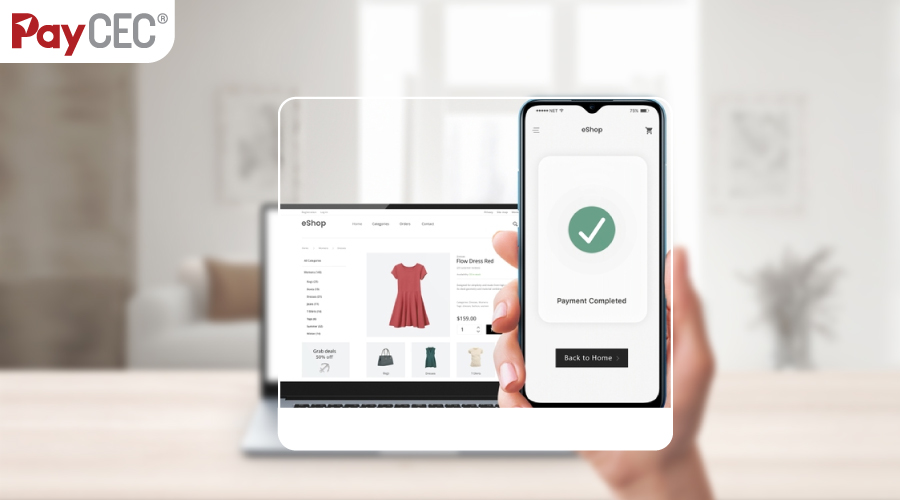- Hotline +65 6631 8332
Why a Multi-Vendor Payment Gateway Is The Missing Piece to Your Success Puzzle
Friday, 01 Sep, 2023

This article is a part of PayCEC payment insights
Follow PayCEC - global payment gateway to get updates on the latest payment trends and ecommerce news
What's inside?

Multi-vendor payment gateway is the epitome of ‘small but mighty’.
The e-commerce business has expanded rapidly, with worldwide sales expected to reach $6.3 trillion by 2024. With a multi-vendor marketplace to manage various suppliers while focusing on site management and growth, who's to say you can't be the next Jack Ma?
However, launching your online store is just the beginning; the choice of your payment solution can make or break your business. A multi-vendor payment gateway is a ray of hope if you use it right.
Amidst the abundance of payment gateway vendors, the real challenge lies in choosing the one that harmonizes with your marketplace platform.
In this article, we dig deep into the world of payment gateways, walk through their intricacies, and ultimately reveal the keys to turning your payment system into a powerful asset.
Single vs Multi-Vendor Marketplace
When it comes to online markets, there are two major types to consider: single and multi-vendor websites.
The key differential is the number of suppliers that these platforms support, and this distinction has a significant influence on payment processing dynamics and accounting software selection.
For single-vendor stores, payment processing is a breeze. All buyers direct their payments to only one supplier, and the website owner merely provides the necessary payment details to receive funds. The streamlined nature of this approach ensures frictionless transactions.
Multi-vendor markets, on the other hand, provide a more complicated payment process with many vendors and different bank balances. However, they have a distinct benefit in that they allow customers to purchase from numerous merchants at the same time.

The intricacy of multi-vendor marketplace payment gateways is a double-edged sword.
Consider the case of a single-vendor marketplace on which a merchant sells their items. Three key players are involved here: the vendor, the buyer, and the middleman who bridges their transactions (PSP, acquirer, etc.).
For such a marketplace, the retailer's focus lies in catering to the local payment preferences of consumers and integrating a tailor-made solution with the aid of a service provider.
Multi-vendor markets, on the other hand, act as a middleman between a variety of vendors and their prospective consumers. The marketplace may provide its items concurrently, entwining its roles as a vendor and a facilitator.
The payout structure is also separate, with the marketplace receiving cash from buyers and then paying it to sellers after subtracting costs, typically through a multi-vendor marketplace payment gateway.
What are Multi-Vendor Payment Gateways?
A multi-vendor payment gateway is a payment system tailored to multi-vendor marketplaces.
Customers can use this payment gateway to make purchases from numerous merchants, and the payments are transferred straight to each vendor's account.
From a merchant's perspective, multi-vendor marketplace payment gateways help to accept payments made with various methods and swiftly return responses, fostering a fluid exchange of digital commerce.
This type of payment gateway vendor makes it easy for merchants with worldwide consumers to accept payments in numerous currencies and payment methods.
It enables them to overcome hurdles, leverage a diverse range of customers, and capitalize on global economic prospects, promoting overall growth and diversification of their online stores.
Beyond the SaaS payment gateway, these gatekeepers encompass processing and acquiring capabilities, alternative payment methods, fraud detection, payment data tokenization, and a host of related services.
How To Choose The Perfect Payment Gateway Vendor

To determine the best payment gateway, various elements must come to mind.
Beyond mere transaction processing, the most reliable gateways go beyond this fundamental role and efficiently execute various transaction types for businesses and marketplaces, including:
- Authorization: At this critical stage, the payment gateway vendor checks a customer's finances before the marketplace or business may make a deal.
- Capture: When a payment is authorized, the gateway processes a transaction and sends money to the merchant's account.
- Sale: The successful completion of authorization and capture stages culminates in a sale, ensuring a seamless transaction.
- Refund: In cases of purchase cancellations or returns, the multi-vendor payment gateway processes refunds, and merchants apply refund payments to return the money to the buyer.
- Void: Similar to refunds, the gateway initiates voids if funds were not yet captured by the business or marketplace, providing a safety net for incomplete transactions.
In selecting the ideal multi-vendor marketplace payment gateway, several essential factors demand careful consideration:
- Customer-friendly Fees: Consider the amount and frequency of your customers' transactions, and choose a multi-vendor payment gateway that charges reasonable and transparent fees, complimenting your business strategy and promoting repeat purchases.
- Streamlined Integration: Besides simple integrations like adding a Smart Payment button, custom integrations necessitate PCI DSS certification and entail additional time and expenses. Choose a payment gateway vendor that seamlessly integrates with your platform, ensuring a smooth and swift setup.
- Technical Support: Assess your business's reliance on technical support and opt for a vendor payment gateway that offers responsive feedback mechanisms or around-the-clock phone support in multiple languages, ensuring prompt resolutions to any challenges.
- Global Reach: Consider the geographical scope of your marketplace and ensure your chosen gateway supports the countries vital to your business. Beware of restrictions some payment gateway vendors might have in specific regions, and opt for the one with a broad global reach.
Choose PayCEC as Your Payment Gateway Vendor

Break the glass ceiling with PayCEC and see how far you can go.
PayCEC allows merchants to accept payments in many currencies. They may sell their goods or services to a broad spectrum of customers, breaking down geographical borders and expanding their customer base.
Different regions have different preferred payment methods. By accommodating various payment options like credit cards, digital wallets, bank transfers, and more, merchants can cater to the payment preferences of their international customers.
PayCEC can help decrease cart abandonment by offering secure and simple payment processing that customers can rely on. We boost the chance of clients completing their purchases by making the checkout procedure as simple as possible.
Standing at the forefront of the payment gateways landscape, PayCEC continually evolves to detect and combat financial fraud with the latest security and anti-fraud tools:
- Payment Card Industry Data Security Standard (PCI DSS): This set of industry regulations, mandated by card payment schemes, serves as a crucial shield for businesses handling card transactions.
- 3D Secure: This authentication mechanism, also known as 3DS, strengthens consumer verification by adding an extra layer of security against chargebacks and fraud.
- Data Encryption: The moment you enter your card details at checkout, the vendor payment gateway springs into action, encrypting the data into indecipherable code, rendering it impervious to the clutches of fraudsters.
- Tokenization: Tokenization provides greater security because the information is only delivered once by the platform, assuring impregnable protection for every transaction.
Flexibility takes center stage as PayCEC processes transactions across multiple payment methods, pairing with your preferred marketplace or merchant. PayCEC's specialized team stands ready to build specific integration solutions, ensuring the best match for your business's demands.
PayCEC's presence extends across borders, providing optimal support to the countries critical to your company. With no boundaries to hinder your growth, embracing PayCEC empowers your marketplace to thrive on a global scale.
Step into the world of multi-vendor payment gateways and unlock the power of PayCEC. Seize the opportunity now by contacting us at [email protected], and let us guide your marketplace toward unprecedented success.
About PayCEC
PayCEC was established in response to the growing need of businesses to accept online payments more quickly and easily. In the new media era, our payment flow has evolved to work seamlessly and effectively across all platforms and devices. We pride ourselves on combining superior technology with first-class customer service.
PayCEC is a truly global payments platform that not only allows customers to get paid but also withdraws funds to their business accounts in various currencies.
We have created an open and secure payments ecosystem that people and businesses choose to securely transact with each other online and on mobile devices.
Read more:
- Payment gateway for unregistered business
- 4 types of payment gateway - Advantages and disadvantages
- What is difference between 2D and 3D payment gateway?
- Multi currency payment gateway & multi currency merchant account
- What are the benefits of online payment gateway?
- The Best Payment Gateway For Online Stores
PayCEC Team
- [email protected]
- +44 2032 864370
Frequently Asked Questions
What is the multi-vendor system?
A multi-vendor system, also known as a multi-vendor marketplace or platform, is an online platform or marketplace where multiple independent vendors or suppliers can offer their products or services to customers.
These systems provide a centralized platform where customers can browse and purchase items from various sellers, often within a specific niche or industry.
Key features of a multi-vendor system typically include:
- Vendor Accounts: Each vendor or seller on the platform has a dedicated account. They can create listings for their products, manage inventory, and handle orders.
- Product Listings: Vendors can create and manage their product listings, including descriptions, images, prices, and other relevant information.
- Order Management: The system manages order processing, allowing vendors to receive and fulfill orders placed by customers.
- Payment Processing: Multi-vendor systems usually handle payment processing, collecting payments from customers and distributing the revenue to the respective vendors after deducting fees.
- Rating and Reviews: Customers can leave reviews and ratings for vendors and their products, helping other customers make informed purchasing decisions.
- Admin Controls: The platform's administrators have control over the overall functioning of the marketplace, including monitoring vendors, resolving disputes, and ensuring compliance with platform policies.
- Commission and Fees: The platform often charges vendors a commission or fee for each sale made through the marketplace. This revenue helps sustain the platform's operations.
- Search and Navigation: Customers can search for products, filter results, and navigate the platform to find products from various vendors.
- Customer Support: The platform usually provides customer support to address any issues customers might encounter while using the marketplace or purchasing from different vendors.
Amazon Marketplace, eBay, Etsy, and Airbnb are all instances of multi-vendor marketplaces. These platforms have grown in popularity because they enable multiple vendors to access a larger audience and provide buyers with many options from multi-vendor payment gateways.
What is the multi-vendor marketplace platform?
A multi-vendor marketplace platform is a software solution designed to allow independent sellers or vendors to showcase and sell their products or services.
This platform serves as the foundation for creating a virtual marketplace that brings together sellers under one digital roof, allowing them to reach a larger audience and improve customer shopping experiences.
At the heart of a multi-vendor marketplace are features tailored to vendors and customers. Vendors can easily set up accounts, manage their profiles, and oversee product offerings. They have the flexibility to create comprehensive product listings that include high-quality images, detailed descriptions, and accurate pricing information.
Integral to the success of this marketplace platform is its seamless integration with multi-vendor payment gateways, which ensures secure and hassle-free transactions. Moreover, these platforms often include mechanisms for customers to rate and review vendors and their products.
One distinguishing feature of multi-vendor marketplace platforms is the ability to compute and deduct commissions and fees from vendor sales. This revenue generation mechanism supports the platform's sustainability and ongoing maintenance.
Finally, customization options allow marketplace owners to brand and tailor the platform's appearance to match their unique identity. Security features are paramount in these platforms, as they handle sensitive customer and vendor data and facilitate secure financial transactions.
What is a payment gateway vendor?
A payment gateway vendor is a company or service provider that offers a solution for processing online payments.
It enables businesses to securely accept various forms of electronic payments, such as credit cards, debit cards, digital wallets, and other online payment methods.
Meanwhile, a multi-vendor gateway is a payment gateway system intended for multi-vendor marketplaces or platforms.
In a multi-vendor marketplace, independent sellers offer their products or services through a single online platform. A multi-vendor gateway extends the capabilities of a standard payment gateway to cater to the complex financial transactions involved in such marketplaces.
Key reasons to consider using a multi-vendor marketplace payment gateway include:
- Facilitating Vendor Payouts: When a sale is made in a multi-vendor marketplace, each seller must receive their portion of the money. A multi-vendor gateway simplifies the financial part of running the marketplace by automatically dividing the money between the platform operator and the appropriate vendor.
- Reducing Administrative Burden: Manually handling vendor payouts and tracking transactions can be time-consuming and error-prone. A multi-vendor gateway automates these processes, reducing the administrative burden and allowing marketplace operators to focus on other aspects of their business.
- Scalability: As a multi-vendor marketplace grows, managing payments and vendor payouts can become increasingly complex. A multi-vendor gateway is designed to handle such complexities and can scale with the marketplace's growth.
Ultimately, the decision to use a multi-vendor gateway depends on the specific needs of your marketplace and its complexity.
What is Stripe multi-vendor?
Stripe Connect is a multi-vendor payment gateway provided by Stripe. It enables businesses to build and operate multi-vendor marketplaces or platforms where independent sellers or vendors can offer their products or services and process payments seamlessly.
Stripe Connect simplifies multi-vendor payments by automatically splitting revenue between platform owners and vendors based on preset rules. It allows customizable fees, supporting various payment models. Customers enjoy a smooth checkout process when purchasing from multiple vendors in one transaction.
Vendors can smoothly join the marketplace using Express, Custom, or Standard account onboarding options. Detailed reporting, risk management tools, and currency conversion enhance performance and security. Stripe Connect also offers developer-friendly APIs for seamless integration into marketplace platforms, providing flexibility and customization options.
The payment gateway vendor is especially useful for firms wanting to construct and manage multi-vendor marketplaces without building a payment infrastructure from scratch. It supports a variety of marketplace formats, including e-commerce platforms, service markets, and others.
What is WordPress multi-vendor payment?
WordPress multi-vendor payment refers to the capability of handling financial transactions within a multi-vendor marketplace established on the WordPress platform.
In a multi-vendor setup on WordPress, where various vendors sell their products or services through a shared online marketplace, specialized plugins or themes are often utilized.
The concept of WordPress multi-vendor payment encompasses a range of functionalities:
- Dividing Earnings: This involves the automatic division of payments between the platform owner and individual vendors when customers make purchases. The payment system calculates and allocates earnings to vendors according to predetermined rules.
- Integration of Payment Gateways: The setup seamlessly integrates with different payment gateways, allowing customers to securely pay for their purchases using various methods like credit cards, digital wallets, and more.
- Management of Commissions: The system manages the commissions or fees that sellers must pay to the platform owner in exchange for using the marketplace infrastructure, which might be based on a percentage of sales or a predetermined amount.
- Streamlined Checkout: The payment process ensures a smooth and user-friendly checkout experience for customers, whether buying from one vendor or multiple vendors in a single transaction.
- Financial Reporting: Comprehensive reporting mechanisms provide insights into sales, earnings, and commissions, benefiting administrators and vendors alike.
- Vendor Entry: The payment configuration encompasses a simplified onboarding process for vendors to join the marketplace and establish secure payment accounts.
- Currency and Conversion: If the multi-vendor marketplace is worldwide, currency conversion is handled via the payment system. Customers may pay in their preferred currency, and suppliers can receive payments in their native currency.
- Security and Compliance: The payment solution prioritizes security standards to safeguard the sensitive data of customers and vendors. Adhering to regulations like the Payment Card Industry Data Security Standard (PCI DSS) is of utmost importance.
- APIs and Integrations: The system may offer application programming interfaces (APIs) and integration options to facilitate customization, extension, and connections with external tools.
What are PayPal multi-vendor payments?
PayPal multi-vendor payments encompass the capabilities provided by PayPal to facilitate transactions within a multi-vendor marketplace.
The capacity to handle vendor payouts is a feature of PayPal multi-vendor payments implying that client payments can be distributed automatically between the platform owner and individual merchants based on specified standards.
PayPal also smoothly interacts with different payment options, including credit cards, debit cards, and account balances. This adaptability provides clients with diverse payment methods, boosting the buying experience.
Additionally, multi-vendor payments via PayPal allow marketplace operators to define and collect platform fees or commissions on each transaction, generating revenue that supports the platform's operations.
Customers benefit from a unified checkout experience, as they can conveniently purchase items from multiple vendors within a single transaction. It streamlines the payment process and contributes to a seamless shopping journey.
On the administrative side, PayPal provides reporting tools that offer insights into transactions, sales trends, and revenue distribution. This data is valuable for both platform administrators and vendors, aiding in tracking and optimizing financial performance.
In essence, PayPal's multi-vendor payments offer businesses the means to establish a secure and efficient payment ecosystem within their multi-vendor marketplace. This solution streamlines vendor payouts, enhances customer experiences, ensures accurate revenue distribution, and leverages PayPal's established reputation in online payments.
News
Business
Products

who we are
about us
We are honored to serve as your reliable business partner and financial service provider in the industry and other business-related services. With the help of our professional staff, to help merchants to achieve their goals for the development and expansion of the international business market.
Our payment flow has developed in the e-commerce world to perform seamlessly and effectively across all platforms and devices. We take pleasure in combining technology with customer service, to solve your concerns at the moment.
PayCEC is a fully worldwide payment network that not only allows merchants to be paid immediately and securely, but also allows them to withdraw money in multiple currencies to their company accounts.
































 +65 6631 8332
+65 6631 8332






 Processing
Processing